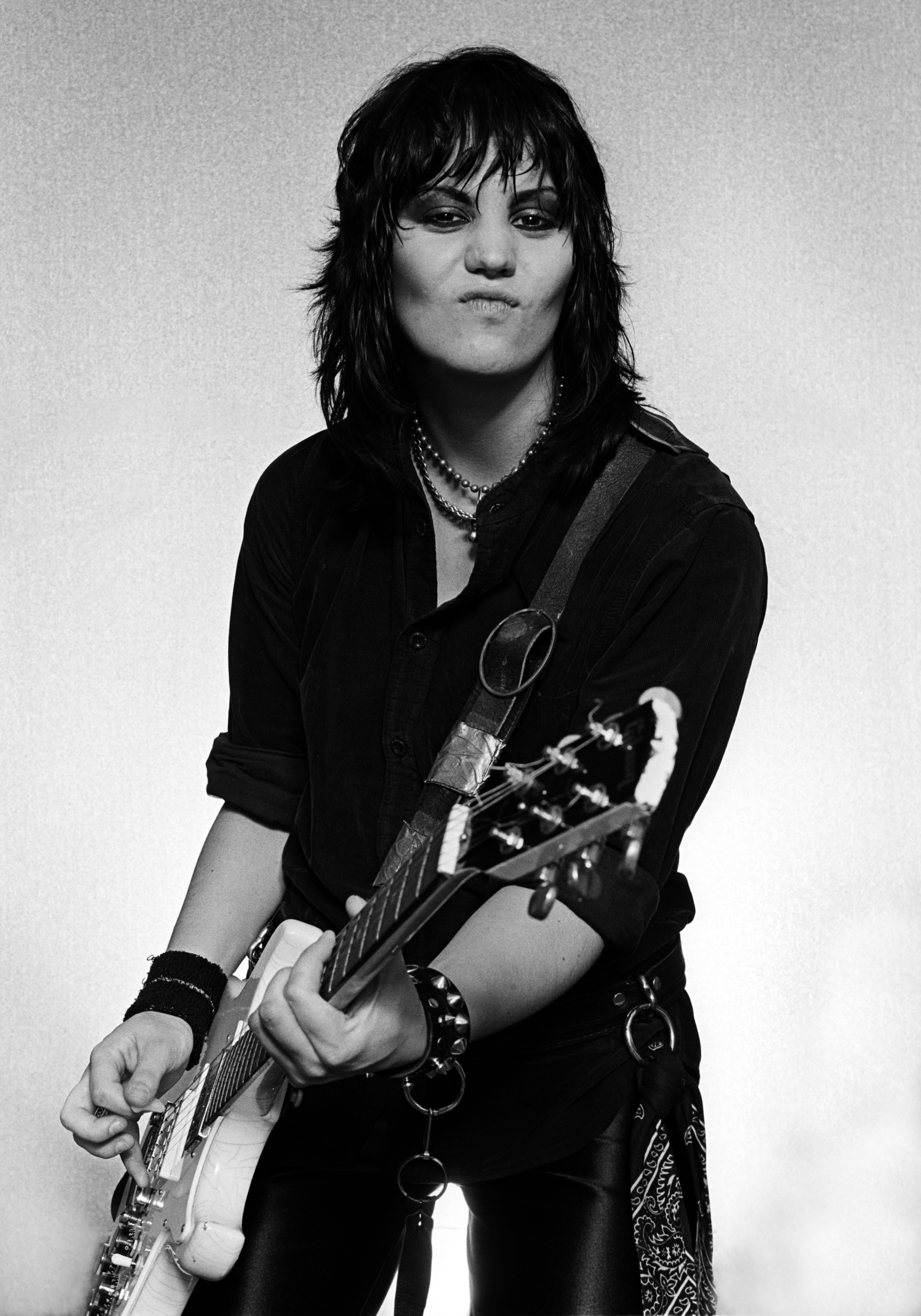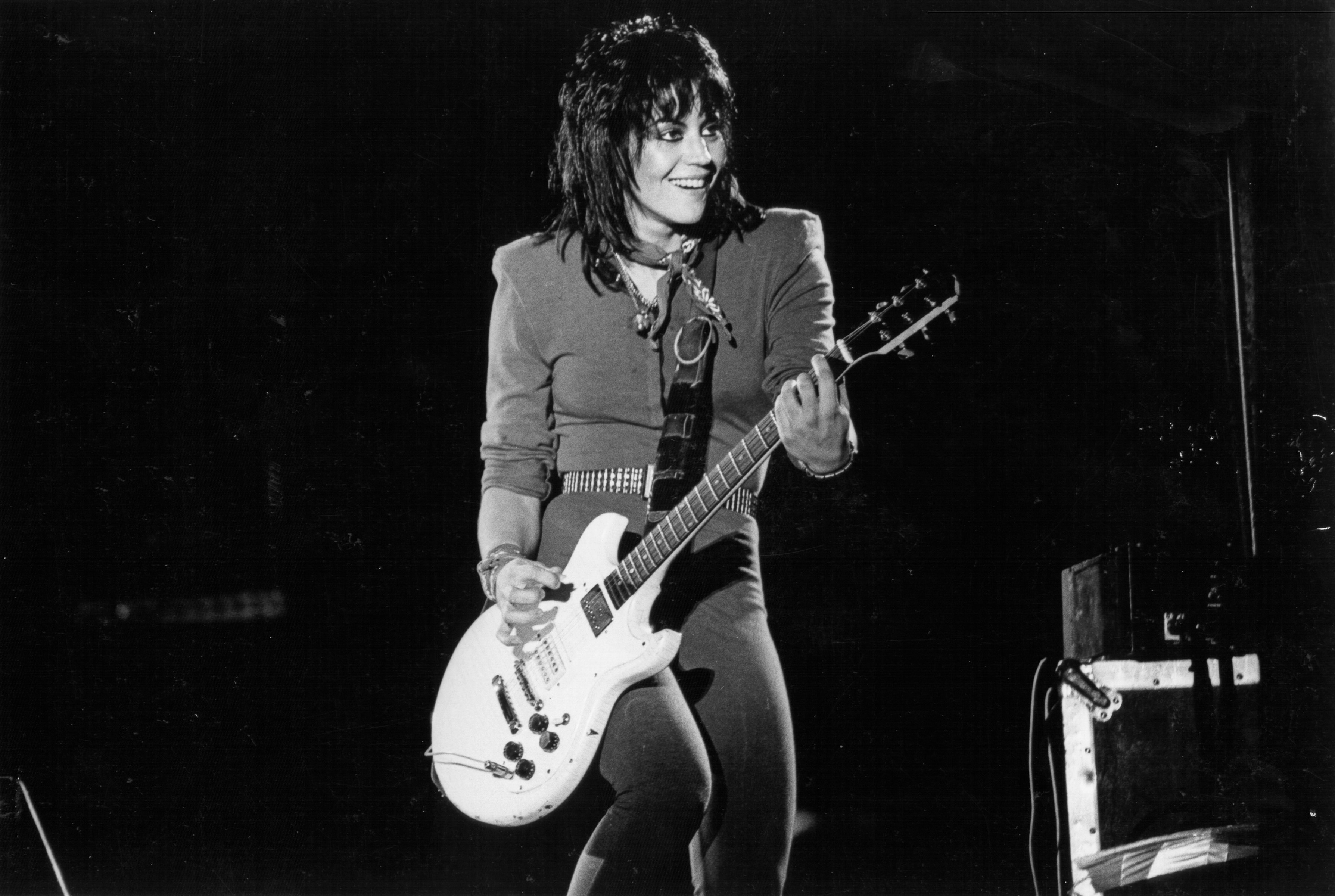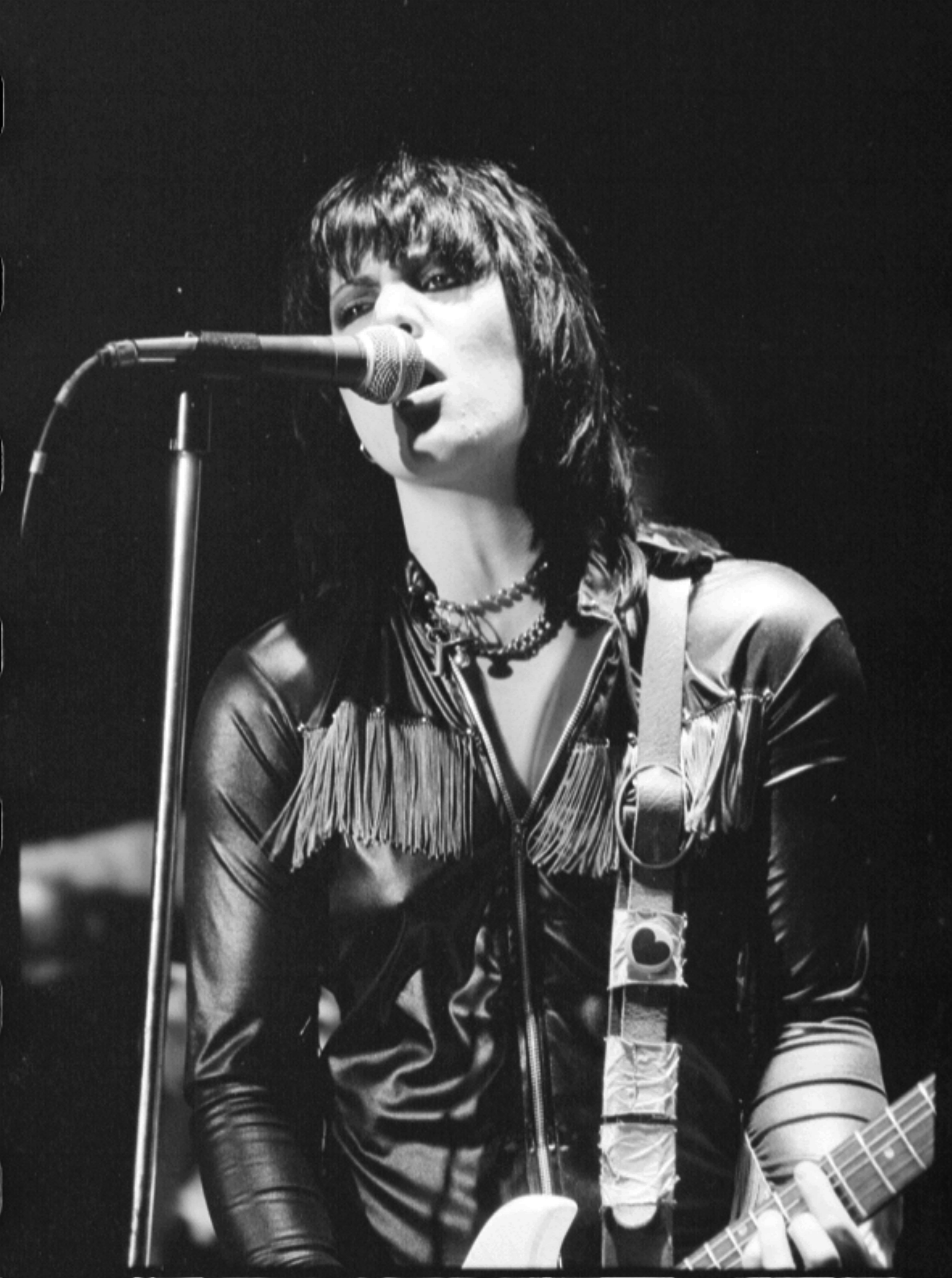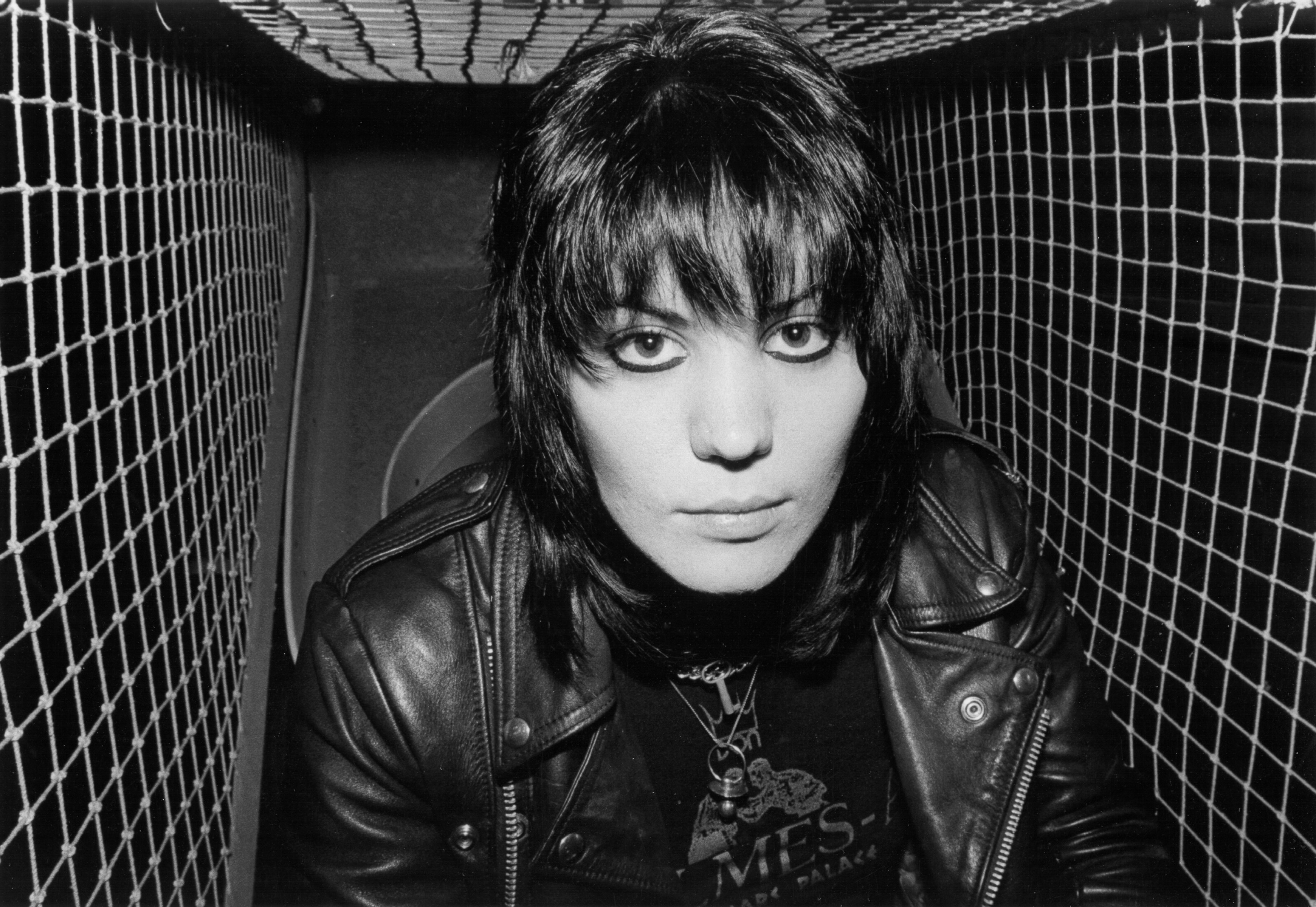This article originally appeared in the May 1987 issue of SPIN.
There is a lot of kindness and compassion in rock 'n' roll.
That may sound strange, but it's true.
—Kim Fowley, former manager of Joan Jett and the Runaways
Twenty degrees and ice everywhere you look and Joan Jett is sitting on the steps of her tour bus parked outside the stage entrance of the Palace Theater in Albany, New York; the bus door's wide open. "Okay you guys," the road manager's saying. "Joanie'll talk to everybody, but you gotta get in line, right?" A hundred farm-fed faces in leather jackets, long-haired girls and longer-haired boys, huddle into the queue, and they wait. It's Tuesday night, and the only other action in this town is the tractor-trailers careening down I-90. Twelve, 12:30, and the kids keep up their vigil while Joan signs notebooks, records, headbands, ticket stubs. She's sharp, compact, and she looks you in the eye like she's known you since eighth grade.
"Joan, I'm in a band, and we're trying to rock 'n' roll, but it's hard." This is a girl about 16, who stood in front of Jett all through her show and shouted along to every word of every song the Blackhearts played.
"Yeah, I know it's hard." Joan says in her gravel rasp that lets you know just how hard. "But the most important thing is to keep playing. Even if ya gotta play for nothin', or almost nothin'."
"That's what you did?"
"Yeah. Plenty of times. Ya gotta keep playin'. 'Cause then, you can get a following. And once you get a following, you can get more gigs, and get a bigger following."
"And then," she smiles, her mouth sneaking up at the corners like a leprechaun-gone-wrong, "once you get a following, nobody can take that away from you. You can do anything."
Do you believe in rock 'n' roll? Do you believe in the magic that'll thrill your soul? Do you still wanna die before you get old?
[caption id="attachment_id_338621"]  Mark Weiss/Getty Images[/caption]
Mark Weiss/Getty Images[/caption]
"I never got over seeing Jailhouse Rock," is one of the first things Kenny Laguna, who's managed Joan for the last eight years with his wife Meryl, tells me. "Whoa! And then there was Chuck Berry! And then there was this whole thing. And it became more important to me than politics, more important to me than anything else in this society. Rock 'n' roll. It meant something. It changed my life. It changed a lotta things."
Kenny's at the wheel of a rented Lincoln Continental, Meryl's up front, and me and Joan and seven-year-old Carianne Laguna are scrunching together in the back sear; like mom and dad and the kids in the 'burbs, and this is the way it is for Joan a lot of the time, 'cause she lives with Kenny and Meryl and Cari in Rockville Center, Long Island, when she's not on the road. But we are not on the way to the shopping center, we are going to the Gavin Report seminars at the Westin Hotel in San Francisco, a big schmoozarama of AOR and Top 40 radio and record promotion people.
"It's not a Joan thing to go and do this kind of promotion." Kenny talks fast, and constantly. He started in the business when he was 15, playing keyboards, and writing songs for Tommy James and the Shondells; now he's nearly 40.
"In a way this is weird, 'cause you got all these artists on display, y'know: 'Here you guys—touch your artists! You've played the records, now such the flesh!' But we do this thing on a one-to-one basis constantly with the radio stations when we tour. We live and die by radio. Or we did. Now, with the movie, I think they're gonna give her more respect. Ya see, we're a very mainstream population in America now; a lotta rock 'n' roll ethics are out the window."
Rock 'n' roll ethics?
"Yeah, there was a time when a rock 'n' roll band wouldn't even be on TV if they were a real rock band. Like Led Zeppelin 10 years ago. And if an act endorsed a product, that act was, like, over! I still believe an act's not a rock 'n' roll act after they do commercials. the kids like you for your music, not your taste in Wheaties, right?"
"We get a lotta offers to do that kind of stuff…endorsements," Joan says. "And I just can't…it doesn't feel right. And when I hear other bands taking their music and making commercials out of it, it just ruins the music for me forever. I get sick inside."
"Whey do they do commercials, Joan?" asks Carianne.
"'Cause they make money from it, Cari."
We pull up in the driveway of the hotel, which is swarming with industry types: lizard boots and satin jackets; T-shirts and Rolexes.
"It all makes you wonder," Kenny sighs. "Is this what Elvis fought for?"
https://youtu.be/wMsazR6Tnf8
Most people remember Joan Jett from her first group, the Runaways, an all-girl rock band that Joan formed under the aegis of impresario Kim Fowley when Joan was around 15. The Runaways scared the shit out of mainstream America: five teenage girls singing loud, fast, and hard about anger, sex, and lust. Of course they were huge in Japan.
Back home was another story. The Runaways were a sensation. A novelty. People showed up at Runaways gigs to ogle, to gape. Fowley's hype-machine didn't help. "We were being presented as a tits-and-ass band, and we didn't realize it," says Joan.
But Joan was dead serious. A journalist writing about the Runaways called her the "dark soul of the band"; the Keith Richards. One night Rush watched them play from the wings of the stage; Joan saw them laughing. "The assholes! They're assholes, and I don't care if you print that!"
After three albums and one sort-of-hit single, "Cherry Bomb," the Runaways broke up. "I think a lot of what happened was the realization that people weren't gonna accept us. We were starting to see these articles people were writing about us, and you could feel the hatred. It was so deep. I can sort of understand how people feel when they're prejudiced against, whether it's black people or Hispanic people. I know what it's like, people thinking you're no good, not as good as them just because you're a girl."
"We were trying to be equal on all sorts of levels, and we were equal, but it made people uptight. They wanted to know why girls were playing rock 'n' roll, and do you think that the fact that you got female skin makes the strings sound different? Different than what!? I mean, I'm tellin' you, people were really askin' us these questions. Like: 'Do you feel like a man or a woman on the stage?'"
Things fell apart. The lead singer, Cherie Currie, left the band after touring Japan. The lead guitarist and drummer wanted to go heavy metal, and Joan wanted to stay rock 'n' roll. Joan was finally the one to say, "I quit." "If I didn't quit they were gonna fire me, and I couldn't deal with getting fired from a band that I started. It was crushing."
She stayed in Hollywood, living on her song royalties in a little place across the street from Whisky A Go-Go. She was 18, she was depressed, and she was drunk a lot. "I felt like everybody in L.A. whenever I was walking' around the streets was sayin' 'Ha ha Joan Jett! The Runaways finally broke up.' I felt like those people who hated us were really having a laugh. I was not in very good shape at all, in my sense of the word."
Kenny remembers she walked into the room with a baseball cap on, ripped-up T-shirt and jeans, and looked pretty screwed up. Overweight. Like she'd been drinking. But he thought she was beautiful. She was different from other teenagers, and he decided he'd like to work with her. So he told the guy who was managing Joan at the time, Toby Mamis, that yes, he'd write some songs and try to produce her.
"I was 28 or 29. A little bit old fashioned, not a lot, but a little. So it freaked me out when I asked her in the studio if we could have somebody overdub a little guitar, and she looked at me like…like I'd have to beat up a woman to do that."
"I mean, I woulda asked any singer-songwriter, let somebody else come in, lay down the guitar tracks in the studio. But she got so nuts when I suggested it. Said: 'What! I can't play guitar on my own fucking record! Fuck you!' And I thought, what a lot of nerve. If I walk outa here, you're screwed up. Where else are you gonna go right now, this is your best shot, why the attitude? But she just said: 'I'm not making records like that. 'I'm gonna play on the basic tracks, or there ain't gonna be a record.'"
"Well, I was really impressed by that. I never met a girl like this before. I said, 'Joan, I'm gonna help you get a record deal.'"
[caption id="attachment_id_338624"]  Anne Fishbein/Michael Ochs Archives/Getty Images[/caption]
Anne Fishbein/Michael Ochs Archives/Getty Images[/caption]
"When I rebel," Joan says, "I don't really take it out on anybody, I just rebel. And I'm the only one who gets miserable. That's the big difference between me and Patti Rasnick [the character Joan plays in the movie Light of Day]. Patti takes everything out on everybody. I like to think I'm a nicer person than that.
"The other thing that was really different is that Patti would play almost any kind of music just to stay on stage, like she went from being in the Barbusters to being in a heavy metal band. I understand that, but I could never do that. I play my three chord rock 'n' roll or I don't go on stage. Patti, I don't think it's fame that she wants, 'cause she says at one point when she's in the metal band, 'Look at these guys, they're dreamin', they think they're gonna be stars. I just go out for the beat.' Well I can relate to that feeling of wanting to be in music for reasons besides becoming a rich star. I'm not in this for the money, but I'm not gonna say I'm not in this to be famous. You wanna be known."
"I mean, it's nice to have money. It's nice to get what you want when you want it. I dunno…I get a lot happier lookin' in people's eyes, seein' 'em think 'Ohmigod she's lookin' at me!' A million people have money, but how many have what I have with the audience? What I have, you can't buy with money. Yeah, it sounds corny. But that's the way I feel."
https://youtu.be/DSqp-W1pWoU
Kenny and Joan made a single with Steve Jones and Paul Cook from the Sex Pistols in England in 1979, then they cut some more tracks in London at the Who's studio; they got the time on spec 'cause Kenny was doing some work for the Who organization. The single got out in Europe, and got on some U.S. radio stations via the import underground. Even so, when Kenny—who by now was Joan Jett's manager/producer/father/best friend—shopped the album for a U.S. deal, he got rejected by 23 labels. It was Meryl who raised $5,000 to finance the printing and pressing of Bad Reputation on their own label, Blackheart. She got the money by emptying out Carianne's college fund.
Joan put an ad in the music classified: Joan Jett looking for three good men to play guitar, bass, and drums. No showoffs please!, and put together the Blackhearts. She lost some weight and Meryl helped her out with her clothes and makeup. The Blackhearts hit the road. Scuzzy tours in Holland. Dives in the industrial Northeast. Opening act for half the rock attractions in the Western world. Cheap Trick. ZZ Top. The Ramones. The Scorpions. There was no strategy, only the nation that it was better to keep rolling than to stand still. So they rolled.
"We had, Meryl and Cari and Joan and me, almost like what a rock 'n' roll band has, you know, that thing," says Kenny. "That's how we survived. You know, you live together, you share, and that thing gives you strength. It felt like the same kind of thing as when I was in rock bands in the sixties, and you'd like all live in the same house."
"It's lucky we had this bond, 'cause we wouldn't have gotten through those years. You can picture Carianne growing up on the road, it was wild. But if we had to play a scuzzy bar in Orlando, Carianne would get to see Disney World."
They finally got the Bad Reputation album out in the U.S., on Neil Bogart's Casablanca label—Bogart was an old buddy of Kenny's. But Casablanca was a disco, not a rock 'n' roll label, and Joan's record "fell in the toilet." So Kenny went back in the studio, and they made another album, I Love Rock 'n' Roll. Pay-dirt. The record went multiplatinum, and the title cut was No. 1 on the charts for eight weeks in the summer of 1982.
[caption id="attachment_id_338626"]  Michael Ochs Archives/Getty Images[/caption]
Michael Ochs Archives/Getty Images[/caption]
"I'm really glad I didn't have immediate success," she says. "Like the first thing I did didn't go No. 1. I think that would've been too tough. This way, we established a base, and that's really important. If everything went really horrible, I'd still be okay. I could still work. I know we got fans all over the country and all over the world, and we could tour on that for the rest of my life."
This is the life: it's Friday, and she's in San Francisco. Upstairs, she's got a room with a view, candles on the night table, clothes (mostly black) stuffed into a Halliburton that looks like it fell of the back of a few trucks. Downstairs, she's got the Breakfast Buffet, with a complimentary pot of coffee. "This is a pretty nice hotel," she says, like someone who knows hotels.
"She takes after her father," says Meryl, passing the coffee. "She's got that work ethic. Her father started out in the mailroom of an insurance company and now he's the vice president. She's got the same focus."
Joan considers this a minute. "Yeah? You really think so? I guess both my parents were always telling me I could do anything I wanted. Go for your dreams. I remember when I told them I was gonna be in the Runaways, and I had to go to Hollywood every day to rehearse, and they were worried, but they never forbid me to do it. I think they felt they owed it to me, cause that's the way they brought me up. I was lucky. Having your parents' blessing is so important. Maybe not on the surface, but deep down."
"One of the first things Paul Schrader asked me when we were working on Light of Day was what kind of relationship did I have with my family. And I told him, great. I don't think that's what he wanted to hear. I think he was hoping that I'd be…neurotic."
Impish grin. Clank of metal biker bracelet against orange juice glass. If you're looking for a strung-out tough chick who spits tacks at breakfast, forget it; this is a successful woman, all of 26 years old. Mom and Dad are proud. She picks up the checks.
The movie offer came at the perfect time. In the years after I Love Rock 'n' Roll, Jett's career had waned again; the next album only went gold, the next one sold less. There were problems between her and her record company, but the main problem was this: Joan Jett played rock 'n' roll, and her core audience was kids. "A lotta the radio stations that played our records started to go for those 'upper demos,' and it got harder for us to get the airplay we used to have," Kenny laments. And it was the "upper demographic" audience—people between the ages of, say, 25 and 35—that the radio stations were trying to sell to.
Still, Joan turned down Paul Schrader's script five times before she decided to take the part of the wayward rock and roller daughter in Light of Day. Originally, Schrader had written the role for Bruce Springsteen, and the film was supposed to be called Born in the U.S.A. Springsteen didn't want the part, but he like the title a whole lot. In return for using it, he wrote Schrader a new title song for his movie: "Light of Day."
Schrader kept looking for a rock singer to play the part, which had now become a female lead opposite brat pack heartthrob Michael J. Fox. There was one further qualification: Springsteen had final approval over who was gonna sing his song.
Joan didn't want to do it. "I didn't want to play a rock 'n' roll singer in a movie, 'cause I had this thing about people stereotyping me—y'know, thinking I was just playing myself. But the more I read the script, the more I realized this girl wasn't like me. I was gonna have to act." She took the part, hired an acting coach, and got to work.
https://youtu.be/4jeTdqDu9i8
When the reviews came out on Light of Day, almost all of them said the same thing: the movie was so-so, but Joan Jett is a star. She has…something. She's a natural.
When the reviews came out, Joan Jett was reading them on her bus with her band, rolling through upstate New York in the dead of winter. "What else are we gonna do?" says Kenny. "Set around Hollywood and read scripts for six months? W don't think movies are better than rock 'n' roll. To sell out a coliseum as a headliner is a much bigger rush than the whole movie/TV thing, dontcha think?"
She won't talk to People magazine. She won't wear skirts. She makes no compromises, and she's managed to turn her obsession into a way of life that works. Two careers. Two families. A boyfriend. A band. Joan and Kenny really believe in rock 'n' roll, and they make me wish I could. But like the other upper demos who stand between Joan and another platinum record, I'm too young to understand what converted Kenny for life and too old to believe that the rock 'n' roll nation will rise again. Or even that it ever existed.
[caption id="attachment_id_338629"]  Anne Fishbein/Michael Ochs Archives/Getty Images[/caption]
Anne Fishbein/Michael Ochs Archives/Getty Images[/caption]
Anyway, here we are backstage at the Palace in Albany, and Joan's getting ready to go on. Kenny's pacing back and forth, nervous, bouncing between Joan and the stage manager with her set list, making changes. There are 20 songs on the sheet, everything from old Runaways hits to Jonathan Richman's "Road Runner" to Tommy James and the Shondells' "Crimson and Clover." "Joan, if you get tired, you can always leave one out."
Joan takes about five minutes to get ready. She wears a red leotard with nothing else on but a floppy black leather belt studded with grommets. If she looks boyish, it's mostly because she's got a body that's been molded into shape over the last 12 years by the weight of a Gibson guitar: strong arms, tough chest, slightly rounded back. "Kenny, my stomach hurts so bad!" She just got her period. "It'll feel better once I get out and start to play. It always does."
She grabs a black magic marker from one of the roadies and scrawls a message on the dressing room wall: Joan Jett and ♥ rool.
"Y'know," says Kenny, out of nowhere, "rock 'n' roll is like this flickering light. It's so fragile now, just hanging on. But I think it's gonna rise again. Of course…I've been saying that for the last ten years."
"It would make me so sad to see it all fade away," says Joan. "It would break my heart. The ideals of rock 'n' roll, how it started, the Rolling Stones. Chuck Berry. You want to teach kids about it. You want them to know. They stay home and they watch all these bands on TV. Well, you know that TV can never match what going to a real concert is."
"Like when you wake up that morning, and as soon as you're awake enough to remember, 'Oh I'm goin' to a concert tonight and you call up your best friend. You get excited, you figure out what you're wearing, you decide where you're gonna meet, and then you meet and you go to the venue, and you see all these other people, and you get more excited. Then the opening act comes on, and you're more excited. And the lights go down and…woah!"
"I wanna make people feel happy like that. Smiling, getting out their anxieties and frustration, yelling and screaming, fists up in the air. I guess that's what makes me happy. And even in the suckiest of times, I can't picture giving it up."
Loud familiar music rises up from the PA system downstairs. "It's the Who," says Kenny. "We always go on to the Who. You should write that. That's very important." Joan runs down the steps to the stage and Kenny follows. "Yeah…and don't forget to write that Joan Jett is the Queen of Rock 'n' Roll, okay?"



